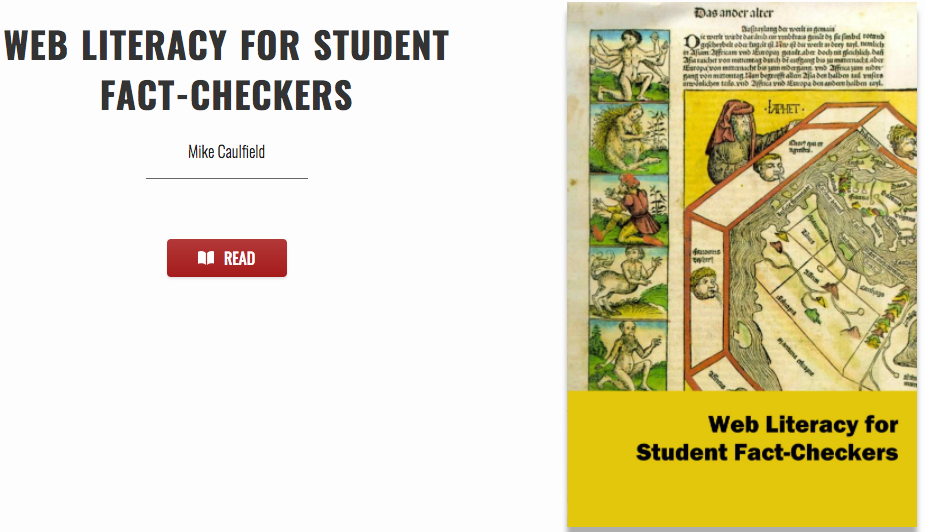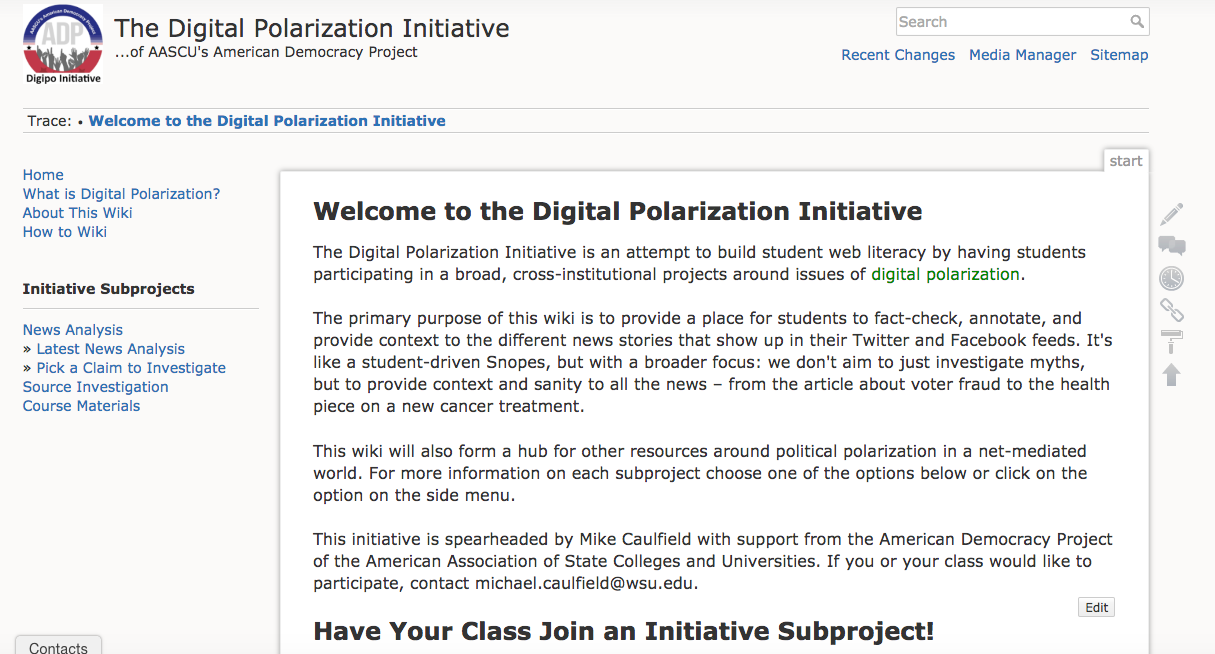As one who teaches research-focused first-year composition classes, the subject of online fact-checking, “fake news,” and information circulation has weighed heavily on my mind for some time now. I began approaching the topic four years ago by asking students to research the question “Does Mr. Rogers have tattoos?” (inspired by the popular internet meme which suggests just that). Despite developing activities over time to help my students with fact-checking, I found I learned more about about it from watching Catfish episodes than I ever did reading informational texts on digital literacy.
The lack of approachable sources on this subject is a problem: within the past year, ethical concerns surrounding information circulation have become more and more prevalent, and studies show that students struggle to decipher between what is real and what is fake in social media environments. The Pew Research Center recently published a report sharing that many experts fear the manipulative behaviors tied to misinformation and trolling on the internet will not only persist, but get worse, in turn compromising the values of democracy.
Misinformation, of course, is not the only issue—but it is an important one—and one that I believe we, as digital rhetoricians, have a responsibility to address in our classes. The DRC has made efforts to do just that with our latest blog carnival Teaching Digital Rhetoric After the Election.
The question for many instructors seems to be how do we teach fact-checking? And what resources are out there?
Mike Caulfield’s Web Literacy for Student Fact-Checkers—an open-source textbook designed to help students fact-check and trace the circulation of online information—helps to answer both of these questions. I interviewed Caulfield about his process for this book and what led to its publication.
During our chat, Caulfield explained that the book was in large part inspired by what he describes as “reading the stream”—or in other words, navigating the never-ending array of content that goes by on our social media platforms. One effect of the stream, according to Caulfield, is that content becomes a blending machine where users are not sure who has produced it.
Within educational environments, students, and people more generally, are taught critical thinking and close reading, but Caulfield’s goal instead was to focus on lateral reading (inspired by Sam Wineburg and Sarah McGrew’s term). In short, students are typically taught to read vertically on a single page, but not to read across various pages and sources to gather necessary context. Caulfield explains that his aim was to “make a book that was less about reading the page and more about taking the 15 seconds to go outside the page to figure things out.”
In Web Literacy for Student Fact-Checkers, Caulfield breaks down “reading the stream” into into four specific tactics: (1) Check for previous work, (2) Go upstream to the source, (3) Read laterally, and (4) Circle back. Each of these moves are further explained by walking readers through specific examples. For instance, one section is dedicated to tracking the source of viral photos, using the image of a poorly parked car surrounded by shopping carts.
 What I most appreciate about Caulfield’s book overall is how accessible it is. As a publication through Press Books, it has all the affordances of a webtext (meaning it includes hyperlinks, allows for videos, shows up in web searches, allows for easy editing), but it also has a very book-like look and feel to it that readers with less web experience may find familiar and navigable. Although clearly a textbook, the project certainly does not limit its audience to students reading on an electronic device as part of a class assignment.
What I most appreciate about Caulfield’s book overall is how accessible it is. As a publication through Press Books, it has all the affordances of a webtext (meaning it includes hyperlinks, allows for videos, shows up in web searches, allows for easy editing), but it also has a very book-like look and feel to it that readers with less web experience may find familiar and navigable. Although clearly a textbook, the project certainly does not limit its audience to students reading on an electronic device as part of a class assignment.
A few weeks ago when I shared a link to Web Literacy for Student Fact-Checkers in a Facebook post, I wrote something along the lines of “this is *not* just for students. Everyone can read.” During our chat, Caulfield shared that the original title actually was “Web Literacy for Student Fact-Checkers and Other People Concerned About Truth.”
I laughed at this extended title during our conversation, but the more I think about it, the more I believe that even in its snark, it gets to the heart of the goal of this project: that is, although teachers and students will find this material valuable, all social media users have a certain accountability within these spaces. At times, I believe our sense of accountability is lost as we are directed to view our online content as “ours” and affecting only ourselves (our profile, our likes, our content, our opinion, etc.). Positioning this book as for “people concerned about the truth” frames the project of fact-checking as a collective one: for and by “the people.”
In this way, fact-checking seems to be just as much about truth as it is about upholding the values of democracy.
If you are interested in pairing the book alongside an activity—or if you are interested more generally in student-driven projects investigating democracy, truth, and digital practices—I encourage you to check out the Digital Polarization Initiative (DigiPo), which Caulfield also organizes.
The goal of DigiPo is to create a space for students to develop web literacy by collaboratively researching and writing on issues that surround digital polarization. The site functions as a politically focused, student-driven, Snopes-like wiki that aims to provide context about recent trending headlines, as opposed to only determining whether a story is true or false. If you or your class would like to get involved, you may find more information about DigiPo here.
A final note: I want to quickly thank Kristi Prins for originally sending me the link to Web Literacy for Student Fact-Checkers and Jason Luther for his help with this review.
Review for:
Webliteracy for Student Fact-Checkers
By Mike Caulfield
Published by Press Books, 2017
Read here: https://webliteracy.pressbooks.com/


